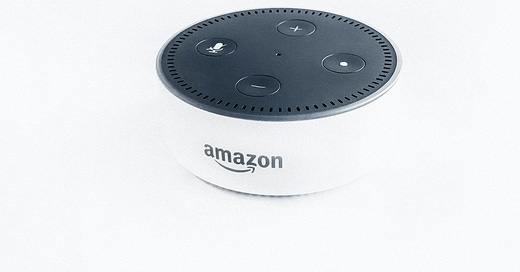A while back, I visited a friend at his apartment. He didn’t really have much furniture and his apartment could have been cleaner, but he was really proud of one thing he did have. We had this conversation:
Him: Hey, check it out man. I got a HomePod.
Me: Oh, nice!
Him: Nice? That’s what you’re going to say to the owner of a HomePod?
There’s a reason why I wasn’t that impressed. In case you don’t know, a HomePod is Apple’s voice-activated home device. While I usually like Apple products, even I got to admit Apple fucked up with that one. It’s a solid product and it’s got a great speaker, but it came out in 2018 - which was way too late in the game. Amazon’s Echo, on the other hand, came out back in 2015, and now it pretty much dominates the smart home market.
Anyway, you might be wondering why an online store like Amazon wastes time on something that seems so unrelated to its core business. Well, there’s actually a pretty good reason for that. Let’s talk about why Amazon invests so much into the home and why that might be a problem for customers.
How Amazon can make your house smarter
An Amazon Echo is a voice-activated device that you can use to play music, listen to Audiobooks, order pizzas, or ask questions - even if you’re incredibly lazy and don’t want to get out of bed. All you have to do is say something like “Hey Alexa, why did my girlfriend leave me?” You probably won’t get an answer that fills the hole in your being, but the device will tell you something.
Side note: I asked this to my Echo just to see what would happen. It said, “Sorry, I’m not sure.”
Amazon’s technology isn’t just limited to its own devices - it’s free-to-use for third-party manufacturers. Many of them were excited about the opportunity to make their devices voice-activated. Now, there are more than 140,000 products that work with Alexa such as lightbulbs and thermostats.
But Amazon’s ambitions didn’t stop there. Back in 2018, Amazon bought the smart doorbell company Ring for $1 billion, which allows customers to look at who’s at their door through their smartphone. It was another way for Amazon to ensure their dominance over the smart home market.
Amazon’s opportunity
Back in September, Amazon had a product event that showed off some big improvements in Alexa. Now, it won’t speak with the awkward pace that virtual assistants typically have. Instead, it can match the tone you’re using and sound like it’s taking more natural breaths and pauses. Also, Alexa now uses AI to make sure that when you ask it to do something like turn on a light, the delay is as short as possible.
There’s a reason why Amazon is investing so hard in improving the product. When the pandemic’s over, our lives aren’t going to be the same as what they were before. Companies all over the country are going to be more comfortable with hiring remote workers - which means people are going to be spending more time at home and less time at the office.
When people like my buddy with the HomePod are spending more time at their apartments and realize how empty and dirty everything is, they’re going to invest in upgrading their space. That’s already happening in the home decor market. Right now, customers are making more purchases at companies like Home Depot and Restoration Hardware, which both saw big increases in their stock price in 2020. It’s possible that these same customers will also invest in products that integrate with Alexa.
What’s Jeff Bezos’s end goal?
Even though the smart home market is growing, Amazon is just breaking even on Echos or even selling them at a loss. Obviously, Jeff Bezos isn’t doing this out of the kindness in his heart. He’s doing it because there’s a couple of ways that the company can profit in the long-term.
Making money on Amazon Skills
Every time you buy an app on the App Store, a cut of the money is going to Apple. It’s a highly-profitable business for them. 3rd-party app developers do the work. Then, Apple does a quick review to make sure there are no viruses and no way that the app can get around Apple’s payment system. Once it’s approved, Apple gets 30% of the revenue every time someone pays for the app.
While Amazon’s attempt to create a smartphone failed really badly, they did find a way to get in on this action with Amazon Skills. These are apps created by 3rd-party developers that integrate with Alexa. You can use these Skills to do things like play Jeopardy with your Echo device or order some pizza from Domino’s. Just like Apple with the App Store, Amazon gets a 30% cut every time somebody buys a Skill on Echo.
More personalization and more purchases
Part of the reason why the Amazon shopping experience is so great is that the company uses data to give customers more personalization. When you make a purchase off Amazon, you’ll see recommendations for related products that can be scarily accurate. That happens because these recommendations are based on the data from the purchases of millions of other customers. Amazon knows exactly what customers with interests to similar you are buying and will recommend the same items to you.
Alexa is an opportunity for Amazon to collect even more data. If Amazon has access to what customers are saying to their Alexa devices, they can better understand these customers’ wants and needs. That means Amazon can make their recommendation engine even more personalized and push these customers to make more purchases.
Plus, when you’ve got so many voice-activated devices around, it’s easier than ever to make a purchase off of Amazon - which means more revenue for the company. All you have to do is say “Hey Alexa, I’m out of soap. Buy me some more.” Then, your Alexa device places an order on your Prime account.
Amazon’s even taken steps to encourage people to do this. For a long time, if you tried to buy Amazon products off of Alexa, it would give you cheaper prices than anything you could find if you just went on Amazon.com on your smartphone or laptop. It was a genius way of getting people to start making voice purchases a habit.
The privacy concerns behind letting Amazon into your house
Amazon devices might make it easier than ever for you to be lazy and never have to leave your couch, but some people are understandably pretty uncomfortable with the idea of a Big Tech company knowing what’s going on inside their homes.
This isn’t some nonsensical conspiracy you heard from your buddy who’s a hardcore Joe Rogan fan. Amazon has thousands of contractors who comb through voice and text transcripts of Alexa devices. While this does help Alexa deliver better responses over time, lots of customers don’t want total strangers looking through personal searches and purchases. Some of these transcripts aren’t wiped from Amazon’s servers, even when a user deletes the conversations.
That’s not the only privacy issue that Amazon’s faced recently. Ring, Amazon’s smart doorbell, took some heat recently for its partnerships with local law enforcement. The company is sharing the footage it gets from its cameras with police departments. That’s an idea that sounds like a good way to stop crime on paper, but may just lead to mass government surveillance of private citizens.
In conclusion
Getting into the home was a fantastic move for Amazon. Now that it’s happened, we all got to ask ourselves some questions. How close do we want our relationships with Big Tech companies to be? What kinds of regulations should we pass to protect our data? With people spending more time at home and more time with Alexa devices, it’s becoming more important for us to figure out the answers.
If you liked what you read, please sign up for our weekly newsletter. We send one email like this on tech and business every week.












Share this post